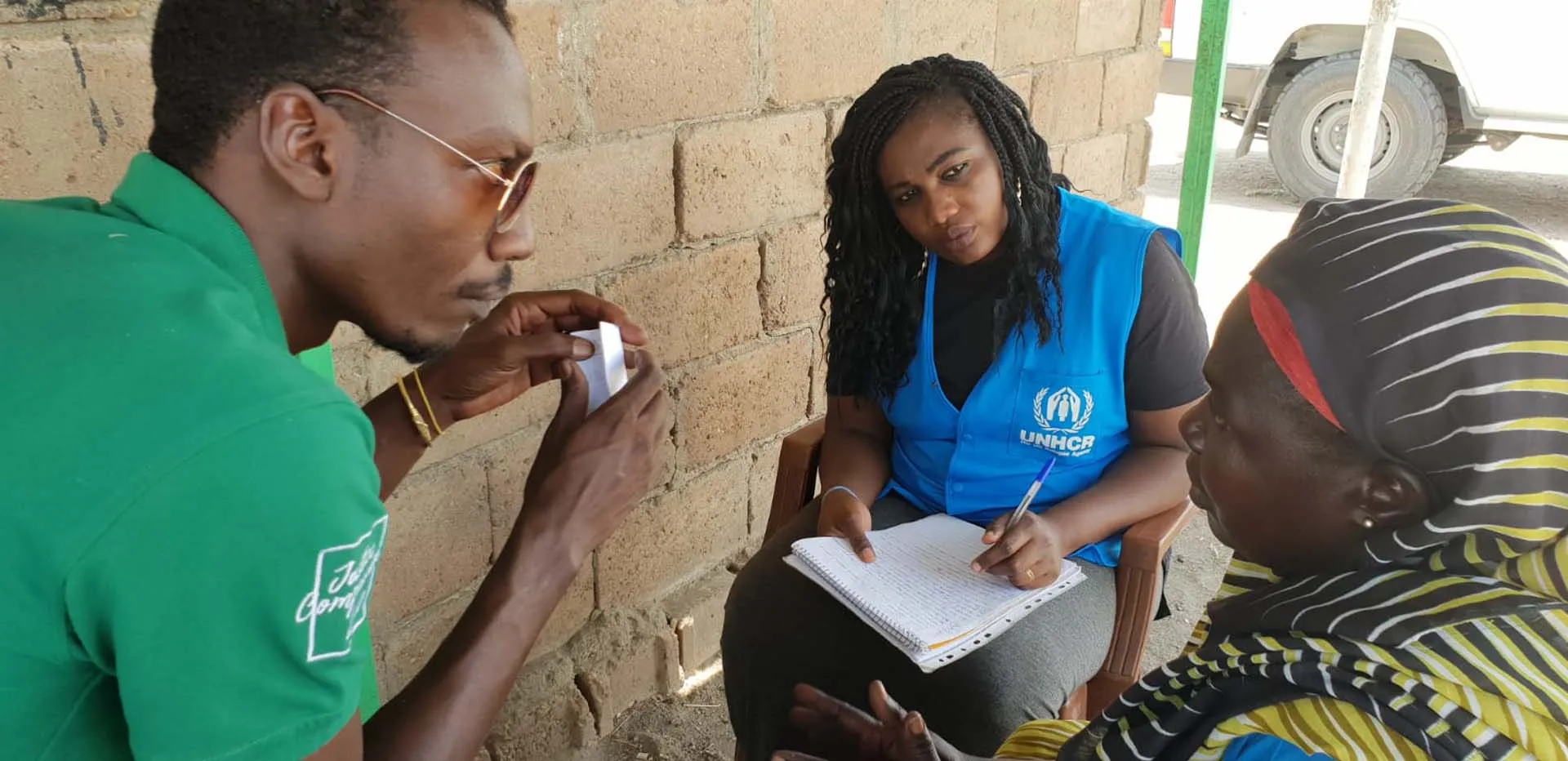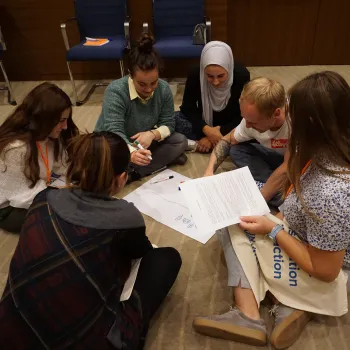

Photo: International UN Volunteer Vanessa Zola, serving with UNHCR in Sudan, interviews a refugee from South Sudan on the work she does making uniforms for refugee children in White Nile State, Sudan.
© UNV, 2020
Respond to allegations of misconduct
UN Volunteers, embedded within the host entity system, work and deliver as part of host entity personnel. They are to be treated equally to all staff. The host entity’s duty of care includes the primary obligation to prevent harm being suffered by UN Volunteers. They also have the responsibility to provide relevant information and support to UN Volunteers in responding to allegations of discrimination, sexual exploitation and abuse, harassment, including sexual harassment, and abuse of authority.
As UN Volunteers are one of the more vulnerable groups to sexual harassment in the UN System, your responsibility in assuring the well-being and safety of volunteers is paramount. Likewise, they will face consequences for their own misconduct, as the organization will not protect perpetrators.
Before starting their assignment, UN Volunteers will have completed the UN mandatory courses on Prevention of Sexual Exploitation and Abuse and Prevention of Harassment, Sexual Harassment and Abuse of Authority, on UNV’s e-learning platform. Despite receiving this training, UN Volunteers are often unaware of who to turn to or how to report or protect themselves by accessing the resources available to them by the host entity. Let’s change this.

Here are some guidelines on how to create greater awareness and support UN Volunteers in responding to allegations of misconduct. In all cases, use discretion when dealing with personal or private information. Follow established protocol within your organization. Overall, when communicating by email, limit the number of individuals informed to a “need to know” basis and not disclosing more information than necessary.
UN Youth Volunteers reviewing case study at UNV youth workshop in Istanbul, Turkey. The workshop includes awareness raising activities on misconduct.
© UNV, 2018
I. Responding to UN Volunteers who report misconduct
During onboarding and during the assignment;
Explain your host entity’s commitment to responding to all forms of misconduct during induction briefing. Reinforce no retaliation principles.
Provide access to ‘Saying No to Sexual Misconduct’ and/or other relevant host entity specific training
Reiterate the rights of the UN Volunteers
Guide them to the UN website on Prevention of Sexual Exploitation and Abuse for self-study
To run your own ‘Say No to Sexual Misconduct’ training day, consult with your focal person and use these lesson plans, activity handouts and notes.
If a UN Volunteer reports that they have been subject to misconduct, you have the responsibility to take their report seriously
Explain their rights, as well as your obligation to keep information private and confidential unless the volunteer explicitly consents to you sharing the information with others.
Reassure that the host entity (and UNV) takes its duty of care to protect very seriously. Also, explain that you may need to inform others on a ‘need to know’ basis if they want you to act.
Listen actively and respectfully. We all need time to collect our thoughts under stress – be patient and supportive.
Be empathetic (“I understand”), not sympathetic (“I agree”).
Stay neutral. Don’t offer opinions, advice or speculate on the facts.
Don’t give advice directly. Let them know their options (see ‘Guide’ section below’)
Do not make promises you cannot keep. It depends on procedures or may require further approval.
If they ask you to report the case, ask what information, if any, they consent to be shared.
Take careful notes for good record-keeping. Put only exact statements in direct quotes.
Review organizational policies and procedures for reporting misconduct and follow accordingly.
• I am sorry to hear this, thank you for sharing with me.
• A lot of people never tell anyone about this kind of abuse, you should recognize your bravery in reporting this.
• What do you need?
• What will help?
• How would you like me to assist you?
• These are your options for action now (share easily navigable and understandable information about reporting, support procedures).
• If you decide to make a formal report – this is what will happen…
• If this is hard to comprehend right now you can come back another time; there is no problem in going over this information again.
• If you prefer to speak to somebody else, these are your options.
• If you chose to speak to other people, here is what you can expect regarding confidentiality and disclosure.
• I’ve heard what you have told me, and I understand you may need time to think about what to do or what I can do. Please feel free to come back to me another time.
While UN Volunteers know you’re there for them, they might not always feel comfortable coming to you about something as sensitive as misconduct. Encourage them to come forward by giving your UN Volunteers with options and sharing contact details for:
Sometimes UN Volunteers may need to counsel to understand their obligations, rights and procedures, resolve conflicts of interest or workplace disputes. Guide them to:
• The Ethics Office of the host entity
• Conduct and Discipline Team (CDT) with UN missions
• Office of the Ombudsman and Mediation Services
• Your Focal Person on Prevention of Sexual Exploitation and Abuse
• Your Focal Person on Workplace Harassment
• Office of Human Resources
Explain how to report specific types of misconduct to your relevant investigation bodies which may include:
• Your organization’s investigative body
• Office of the Ombudsman and Mediation Services for workplace harassment, discrimination and/or abuse of authority
• The Office of Audit and Investigations for UNDP
• Conduct and Discipline Team for UN missions
• UN Office of Internal Oversight Services
Witnessing or suffering trauma means UN Volunteers and their families might need your help contacting:
• Your organization’s counselling team
• Cigna customer service may also assist with related health and well-being issues
• UN Department of Safety and Security’s Critical Incident Stress Management Unit
- Mr. Sohail Ali (East and South Africa):
ali173@un.org, 1- 718-663-1520
- Ms. Djeneba Coulibaly (West and Central Africa):
colibaly45@un.org, +1-646-659-5649
- Mr. Abdalla Mansour Amer (MENA):
mansouramer@un.org, 1-917-402-5182
- Ms. Kalhari Hewage (Asia & Pacific and Russian speaking countries):
hewagem@un.org, 1-917-209-9047
- Ms. Anne-Marie Serrano Banquet (Europe and Americas):
anne-marie.serranobanquet@un.org, +1-917-209-4615
Create a safe and harmonious working environment. Free from fear, hostility and intimidation. Talk about the protection policies in place including Secretary-General’s bulletin (ST/SGB/2005/21) that protects individuals who report allegations of misconduct, including UN Volunteers, from retaliation. Help volunteers contact:
• The Ethics Office of the host entity
• Your whistleblowing protection focal person
Once informed, consult with the authorized bodies in your organization to execute your duty of care responsibilities.
If you are following up on the UN Volunteer’s behalf without expressed consent, do consider the UN Volunteer’s privacy and decision their right to not make a complaint.
Ensure that the rights of the UN Volunteer are not infringed upon.
Ensure proper whistle-blower protection is being afforded equally as to all other staff.
Follow-up on any alleged harassment/retaliation for investigation/protection without delay.
Notify the UNV focal person, Portfolio Specialist at the Regional Office, of cases involving UN Volunteers for information.
UNV, as part of the UN system, takes allegations of all forms of misconduct seriously. As the administrative authority for UN Volunteers, UNV has a secondary duty of care and takes the obligation to ensure the safety and well-being of the UN Volunteers seriously. Accordingly, UNV may liaise with host entities to ensure that policies and practices are being properly applied and that UN Volunteer’s wellbeing and safety is assured.
The Regional Portfolio Specialist (UNV Regional Office) is the responsible focal person to ensure comprehensive responsiveness when receiving reports by UN Volunteer affected by alleged misconduct.
Download PDF Responding to UN Volunteers who report misconduct
II. Responding to Allegations of Misconduct against UN Volunteers
Where a UN Volunteer is alleged to have committed any form of misconduct, such allegations will be referred to the duly authorized investigative body of the host entity. Decisions on whether the UN Volunteer should be suspended from service pending the outcome of an investigation are made by UNV.
As all disciplinary measures regarding UN Volunteers are administered by UNV, host entities should inform UNV of any investigation. And any investigation report should be sent to the UNV Executive Coordinator for his or her review and decision on possible disciplinary sanctions, as applicable.
For more information see section on Misconduct and Disciplinary Procedures applicable to UN Volunteers:



